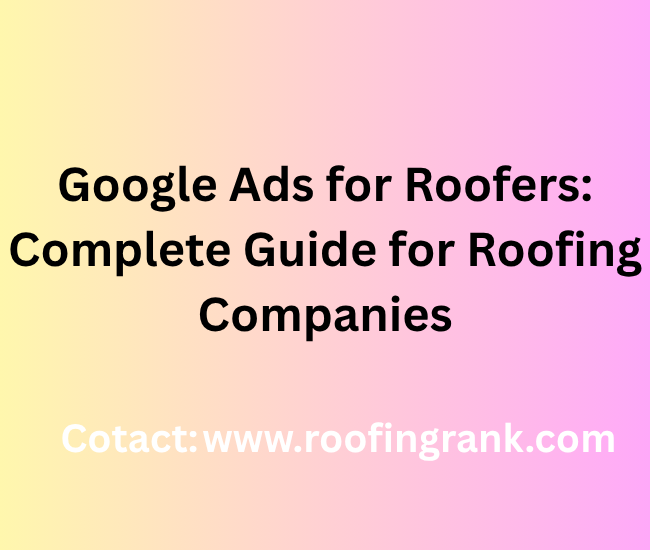Google Ads for Roofers – The Ultimate How-To Guide for Roofing Companies
At Roofing Rank, we specialize in helping roofing contractors succeed through high-converting Google Ads campaigns. If you’re looking to attract qualified leads, book more jobs, and compete locally, this guide explains everything step by step.
1. What is Google Ads?
Google Ads is a pay-per-click advertising platform where you can run ads targeting people actively searching for roofing services. When set up correctly, it connects roofing businesses with property owners who need roof repair, installation, or replacement.
What is the Difference Between Google Ads and SEO?
Google Ads delivers immediate traffic by placing your ad at the top of search results. SEO focuses on earning organic rankings over time. With Ads, you pay per click. With SEO, results build through consistent content and website improvements. Many roofing companies use both.
Benefits of Google Ads for Roofers
- Attracts urgent leads searching terms like “roof repair near me”
- Runs ads at peak times when demand spikes
- Supports service area targeting to reduce waste
- Gives full control over budget and bidding
- Tracks phone calls and form submissions in real time
Create a Google Ads Account for Your Roofing Campaign
To start:
- Go to ads.google.com
- Sign in with your business Gmail
- Set up your billing and business info
- Skip Smart Campaign – choose “Expert Mode” for full control
2. Creating Google Ads for Roofers
Determine Your Advertising Goal
Start with a clear goal: more phone calls, form submissions, or quote requests. This helps structure the campaign toward measurable results.
Choose Your Target Audience
Narrow targeting ensures your ads appear only to homeowners in your service area. Use:
- ZIP codes
- Radius targeting
- City-based targeting
Avoid nationwide targeting unless you handle multi-state roofing projects.
Manual CPC & Bidding for Google Ads for Roofers
Manual CPC bidding gives control over how much you’re willing to pay per click. Roofing keywords are competitive, so setting realistic bids ($15–$30 CPC) is standard in urban areas.
3. Creating Ad Groups for Your Roofing Business Campaign
What are Ad Groups?
Ad groups are categories within your campaign. Each group focuses on a specific service or keyword type. For example:
- Roof Repair
- Emergency Roof Replacement
- Commercial Roofing
Starting Your Ad Groups
Group similar keywords together. A “Roof Inspection” ad group may include:
- free roof inspection near me
- roof inspection for insurance
- roof checkup services
Each ad group should have 2–3 relevant ads and 10–20 keywords.
4. The Anatomy of a Google Text Ad for a Roofing Company
Final URL & Display Path
Final URL is the landing page where the ad clicks go. Display path shows users what the page is about.
Example:
- Final URL:
www.roofingrank .com/roof-repair - Display Path:
/roof-repair
Headlines
You can write up to 15 headlines. Focus on:
- Services (“Emergency Roof Repair”)
- Trust signals (“Licensed & Insured”)
- Location (“Serving Dallas Area”)
- Urgency (“Call Now – Free Estimate”)
Descriptions
Use 2 descriptions, up to 90 characters each. Mention:
- Years of experience
- Free inspections
- Fast service availability
Example:
“25+ Years of Roofing Experience. Schedule Your Free Estimate Today.”
Ad Assets
Assets (extensions) improve ad performance:
- Call Extensions: Show phone number directly
- Location Extensions: Link to your business address
- Sitelinks: Link to key service pages
- Callout Extensions: Add selling points like “Locally Owned” or “Emergency Service”
5. Piecing the Whole Google Ad for Roofers Together
When you combine the right keywords, ad copy, and extensions, you create a compelling ad that attracts qualified leads. Test different combinations for best performance and avoid generic copy.
6. Optimizing Your Google Ads for Roofers
Why Do We Keep Track of Measurements?
Tracking helps identify which ads lead to phone calls or form fills. It also ensures you’re spending money on what works.
How to Add Google Ad Conversion to Your Roofing Website
To track results:
- Go to Tools > Conversions in Google Ads
- Create a new conversion action (e.g., Phone Call or Form Fill)
- Generate a tracking code
- Add the code to your website’s thank-you or confirmation page
Creating a Tag for Your Google Ads for Roofers
Using Google Tag Manager:
- Create a new tag
- Select “Google Ads Conversion Tracking”
- Input conversion ID and label from Google Ads
- Trigger the tag on form submission or call click events
7. What Exactly is a Landing Page?
A landing page is a focused web page built to match your ad. It contains a headline, short service summary, trust elements, and a form or phone number.
What is the Difference Between a Homepage and a Landing Page?
- Homepage: Covers multiple services and general company info
- Landing Page: Focused on one service or offer from the ad (e.g., “Roof Leak Repair in Houston”)
Landing pages convert more because they match user intent better.
8. Keywords to Include in Google Ads for Roofers
Use keywords that match customer search habits. Some examples:
- roof repair near me
- new roof estimate
- shingle roof replacement
- flat roof leak fix
- emergency roof tarping
Use tools like Google Keyword Planner to discover more.
AdWord Keyword Match Types
- Broad Match: Shows ads for loosely related terms
- Phrase Match: Matches searches with your phrase in order
- Exact Match: Only shows ads for your exact term
Start with Phrase and Exact Match to stay focused and reduce waste.
9. Key Takeaways & Mistakes Roofing Companies Make
Common Mistakes Roofing Companies Should Avoid:
- Sending traffic to the homepage instead of a landing page
- Using generic ad headlines without local keywords
- Forgetting to track calls and conversions
- Not using negative keywords (e.g., “free,” “DIY”)
- Ignoring mobile users with poor mobile site design
At Roofing Rank, we help roofers avoid these issues through strategic planning, campaign structure, and lead-focused ad copy. If your roofing business is ready to get more calls from Google Ads, we’re here to help.






